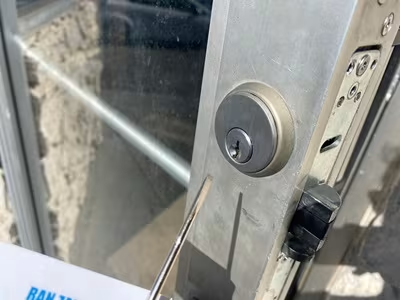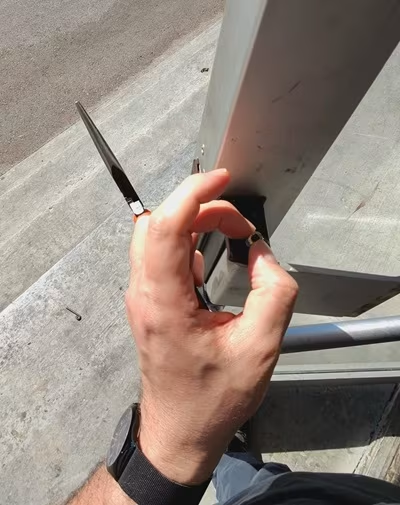Mortise Lock Install & Repair Austin TX - Okey DoKey Locksmith
Mortise lock change service in Austin is provided on-site by Okey DoKey Locksmith as part of our fully mobile locksmith operation. Mortise hardware is built into the door and often appears on older homes, solid wood doors, and higher-grade entry systems, so changing it requires careful fitting and experience. We focus on restoring smooth operation and dependable security while preserving the door, trim, and overall appearance. You can expect professional service, clear communication, and results that feel solid every time you turn the key.
Contents
- Mortise Lock Change Service in Austin
- What a Mortise Lock Is and Why Replacement Is Different
- When a Mortise Lock Should Be Changed
- Mortise Lock Change vs Mortise Lock Repair
- How the Mortise Lock Change Process Works
- Compatibility, Hardware Matching, and Upgrade Options
- Residential and Light Commercial Mortise Lock Changes
- Why Choose Our Locksmith for Mortise Lock Changes
- Get Help Now
Mortise Lock Change Service in Austin
Okey DoKey Locksmith provides mortise lock change service in Austin through a fully mobile, on-site service model. We do not operate a physical storefront, so the service is performed at your door with the tools needed to remove, fit, and test mortise hardware properly.
Mortise locks are not a quick swap like many standard locks because the lock body is housed inside a pocket in the door. A correct change requires accurate matching and careful alignment so the latch, bolt, and handle function as intended.

Our goal is to restore secure, smooth operation without leaving the door loose, misaligned, or difficult to close. We focus on a clean finish and dependable daily performance.
What a Mortise Lock Is and Why Replacement Is Different
A mortise lock is a lock system installed inside the edge of the door rather than mounted through the face like many modern cylindrical locks. Because the mechanism sits inside the door, mortise locks tend to feel solid and are often paired with classic trim, levers, or knobs.
Replacement is different because the new hardware must match key measurements and fit the existing mortise pocket. If the lock body is not aligned correctly, the latch can bind, the deadbolt may not seat, and handles can feel loose.
Mortise locks also vary in design and parts, especially on older doors. That is why careful evaluation matters before a change is started.
If you are comparing lock styles for a different door, it may help to review Deadbolt VS Mortise to understand what each option does best.
When a Mortise Lock Should Be Changed
Mortise lock changes are commonly requested after moving into a new home or when key control is uncertain. Even if the lock still works, homeowners often want to reset access so prior keys are no longer valid.
Another common reason is mechanical wear that causes sticking, difficulty turning, or unreliable latching. Over time, internal components can wear down, especially on high-use doors.
Some homeowners choose replacement after a lock has been forced, damaged, or repeatedly repaired without lasting improvement. In these cases, changing the hardware can restore confidence and daily reliability.
Mortise lock changes are also requested when an older lock no longer matches security expectations or when the door hardware feels unstable.
Mortise Lock Change vs Mortise Lock Repair
In some situations, a mortise lock can be repaired rather than replaced, especially if the main lock body is still structurally sound. Repair may be appropriate when the issue is minor alignment, loose trim, or a specific component that can be restored.
A lock change is usually the better option when the mechanism is heavily worn, damaged, or unreliable over time. Replacement is also common when a homeowner wants a different keying setup or a more consistent feel.
Part availability matters with older mortise hardware, and some locks are difficult to match exactly. We evaluate the condition and explain realistic options before any replacement is finalized.
When replacement is recommended, the focus stays on preserving the door while restoring dependable operation.
How the Mortise Lock Change Process Works
The process starts with an on-site inspection to confirm that the door uses mortise hardware and to identify key measurements that affect fit. This ensures the replacement option is compatible and reduces the risk of misalignment.
We remove the existing lock body and trim carefully to protect the door edge and surrounding finish. Proper handling matters because many mortise doors are solid wood, painted, stained, or paired with decorative plates.
The new mortise lock is fitted, aligned, and installed so the latch and bolt operate smoothly. We then test key turning, latch engagement, and door closing behavior before the service is considered complete.
Final checks focus on daily usability, including a secure close, consistent latching, and a stable handle feel.
Compatibility, Hardware Matching, and Upgrade Options
Mortise lock compatibility depends on the door cutout, faceplate dimensions, and how the lock interacts with the strike and frame. Matching the existing setup often helps preserve the door and maintain a clean appearance.
Some homeowners want to keep the look of the existing trim while replacing the internal mechanism. In other cases, upgrading the full set provides a better long-term result when older parts are worn or mismatched.
When upgrading security on exterior doors, some homeowners prefer a separate deadbolt in addition to mortise hardware, depending on the door style. If your door uses a standard deadbolt setup, our Deadbolt locks page explains common upgrade goals and expectations.
We explain which options are realistic for your door and which upgrades make sense for daily use rather than selling unnecessary hardware.
Residential and Light Commercial Mortise Lock Changes
Mortise locks are common in older residential properties, especially on solid wood doors and classic entry setups. They also appear in certain small offices, multi-unit properties, and doors where heavier-duty hardware is preferred.
Light commercial mortise lock changes often focus on reliability and consistent operation under daily use. These doors may also require tighter alignment due to frequent traffic and closing cycles.

In both settings, the goal is proper fit, solid function, and a door that closes and locks cleanly. We focus on workmanship that supports long-term use rather than temporary adjustments.
Why Choose Our Locksmith for Mortise Lock Changes
Okey DoKey Locksmith provides on-site mortise lock change service in Austin through a mobile model with no storefront. This allows us to bring the right tools and experience directly to the door where the hardware is installed.
Mortise hardware requires careful measurements and alignment, and our approach is focused on preserving the door while restoring dependable function. We communicate clearly about options, compatibility, and what to expect before work begins.
We prioritize clean installation, stable hardware feel, and reliable latching so the lock performs well every day. The goal is a result that feels correct, not a shortcut that creates new problems.
If you are unsure what type of lock you have, describing the door hardware and how the key operates is usually enough to start the process.
Get Help Now
If you need a mortise lock change in Austin, Okey DoKey Locksmith is ready to provide professional on-site service for older doors and specialty hardware. Share your location and a brief description of the door and lock so we can prepare the right approach.
We focus on careful fitting, dependable operation, and a clean finish that preserves the door. Reach out to schedule mobile mortise lock change service brought directly to your property.

